| Shepherds of Christ Daily Writing |
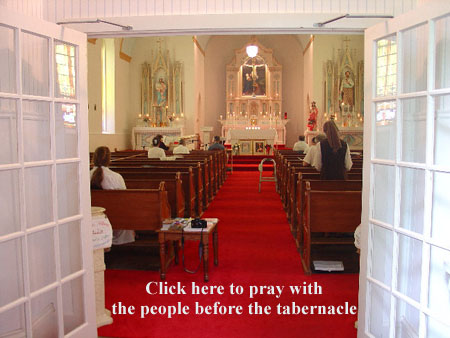 |
April 23, 2016
|
April 24th Holy Spirit Novena |
The Novena Rosary
Mysteries |
Pray for special intentions.
Pray for Dan & Melanie, Jimmy,
Fr. Joe, Mary, Blue Book 16.
Please pray for funds & grace.
Give the gift that Counts.
Blow Out Sale for Reprinting of Blue Book 1, 2 & 3



While Supplies Last
Blue Book 1 - $4 each plus postage
Blue Book 2 - $4 each plus postage
Blue Book 3 - $3 each plus postageCall 1-888-211-3041 for Doris
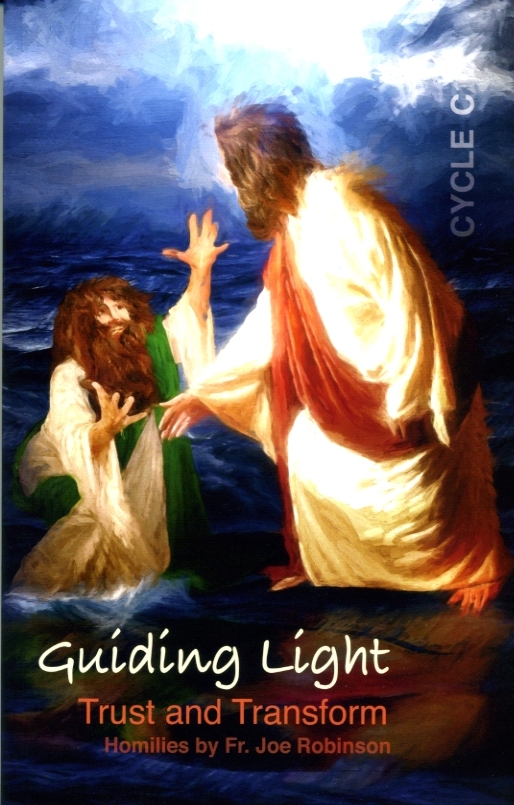
New Homily Book - Cycle C
Available $10.00 plus postage

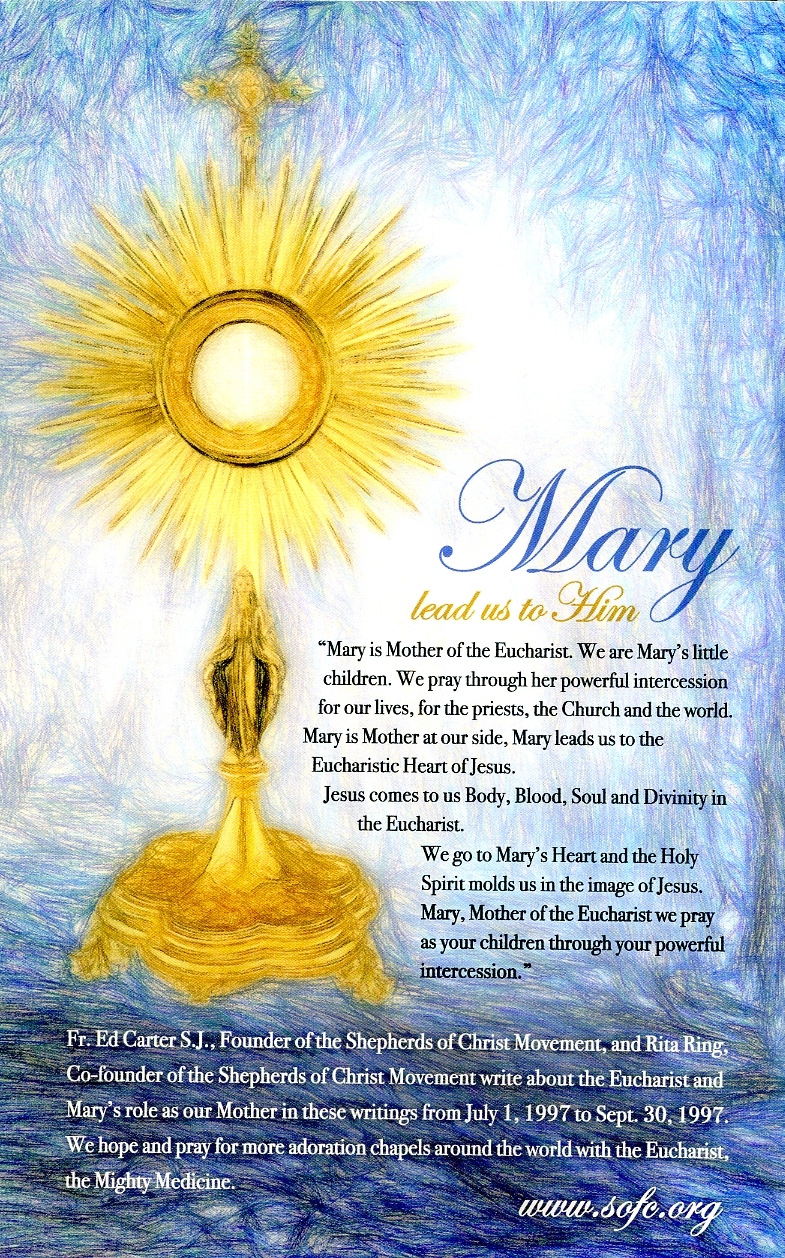
New Blue Book 16 is Available!
April 23, 2016
R. When you tried a new way you can become
lost. Were you ever lost and could not
find your way, but you saw
something and then you knew
the way.
God is leading us closer and
closer to Him if we let go and
follow – we may do some things
that are unfamiliar, but will
lead us from a path of darkness,
a path of entrapment and take
us to a wide green land, a
land flowing with sun light
and milk and honey –
The Israelites wondered 40
years in the desert and it could
have taken them a few weeks –
The Holy Spirit is the Divine God – He
wants to guide us, God sends
guides to guide us, but satan,
very often, tempts the person
to try to control everything
like they know it all. Man
has human knowledge and our
knowing and loving capacity is
elevated in baptism, if we
go to God we can know on a
supernatural level – which
ever grows to greater and greater
knowledge of God.
Who can compare in knowing
on a natural level with
the Divine God leading us.
God created us. How does a
bird know. Why are we so
hoity-toity to think we
must control things and not
see we are pilgrims on a
journey and there is so much
unknown in our life –
Say to the Divine God – Holy Spirit –
guide us, lead us, give us
knowledge – help us to keep
our eyes on eternal happiness
in all our actions –
Come to me Lord and possess
My soul –
Come Holy Spirit come to me –
mold me, and help me to
live in the Light –
Give me Right Reasoning
dear God – help me to do Your
will –
Strengthen my will –
Dear Holy Spirit fill me with love –
Help me to stay rooted in
God. Help me to live a
virtuous life –
Come Holy Spirit – Come Holy Spirit –
Enlighten my eyes to see
the Plan of God and to
walk the road He wants
me to walk –
Readings on Saturday
Song: I am a God of Justice
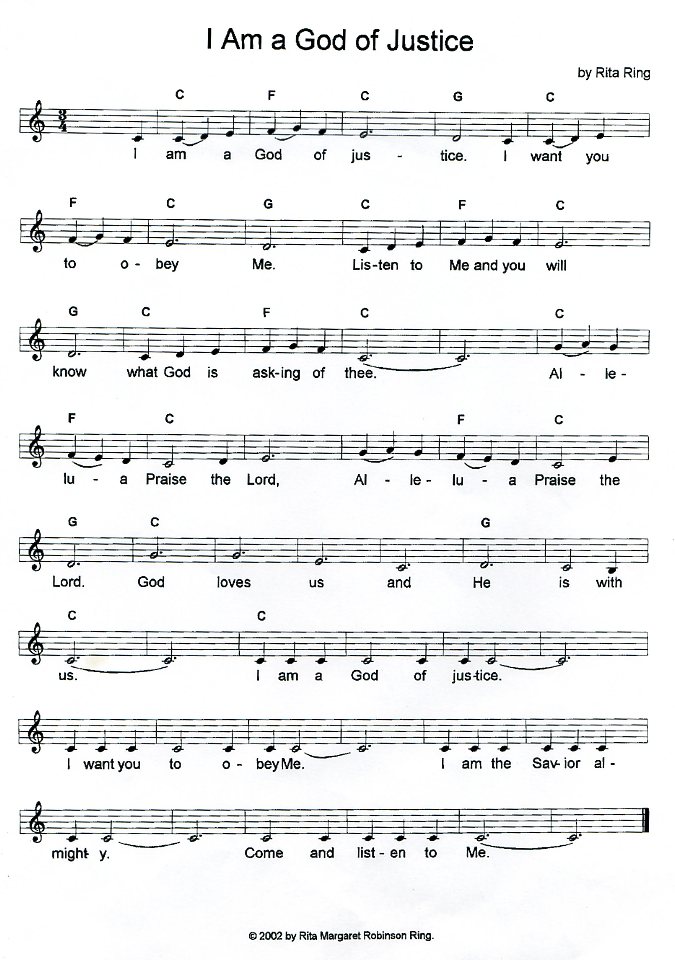
R. God has made us a light to the nations –
Acts 13: 44-52
The next Sabbath almost the whole town assembled to hear the word of God. When they saw the crowds, the Jews, filled with jealousy, used blasphemies to contradict everything Paul said. Then Paul and Barnabas spoke out fearlessly. ‘We had to proclaim the word of God to you first, but since you have rejected it, since you do not think yourselves worthy of eternal life, here and now we turn to the gentiles. For this is what the Lord commanded us to do when he said:
I have made you a light to the nations,
so that my salvation may reach
the remotest parts of the earth.’It made the gentiles very happy to hear this and they gave thanks to the Lord for his message; all who were destined for eternal life became believers. Thus the word of the Lord spread through the whole countryside.
But the Jews worked on some of the devout women of the upper classes and the leading men of the city; they stirred up a persecution against Paul and Barnabas and expelled them from their territory. So they shook the dust from their feet in protest against them and went off to Iconium; but the converts were filled with joy and the Holy Spirit.
Sing a new song to Yahweh,
for he has performed wonders,
his saving power is in his right hand
and his holy arm.
Yahweh has made known his saving power,
revealed his saving justice for the nations to see,
mindful of his faithful love and his constancy
to the House of Israel.The whole wide world has seen
the saving power of our God.
Acclaim Yahweh, all the earth,
burst into shouts of joy!
John 14: 7-14
If you know me,
you will know my Father too.
From this moment you know him
and have seen him.Philip said, 'Lord, show us the Father and then we shall be satisfied.' Jesus said to him, 'Have I been with you all this time, Philip, and you still do not know me?
'Anyone who has seen me
has seen the Father,
so how can you say,
"Show us the Father"?
Do you not believe
that I am in the Father
and the Father is in me?
What I say to you
I do not speak of my own accord:
it is the Father, living in me,
who is doing his works.
You must believe me when I say
that I am in the Father
and the Father is in me;
or at least believe it
on the evidence of these works.
In all truth I tell you,
whoever believes in me
will perform the same works
as I do myself,
and will perform even greater works,
because I am going to the Father.
Whatever you ask in my name
I will do,
so that the Father may be glorified
in the Son.
If you ask me anything in my name,
I will do it.
R. Jesus told me to address this –
The Ten Commandments
1. I, the Lord, am your God. You shall not have other gods besides me.
2. You shall not take the name of the Lord, your God, in vain.
3. Remember to keep holy the Sabbath day.
4. Honor your father and your mother.
5. You shall not kill.
6. You shall not commit adultery.
7. You shall not steal.
8. You shall not bear false witness against your neighbor.
9. You shall not covet your neighbor's wife.
10. You shall not covet anything that belongs to your neighbor.
R. Sin is an act of the will that is
out of order. It is against the will
of God.
When a man does not do the will of
God – he can blame lots of people
for his disobedience to God, but it
is his own free actions in choosing
to disobey what he should do that
brings conflict within himself –
Conflict in his soul comes from
doing his will over God's will.
When a man chooses to take that
which does not belong to him
and belongs to someone else
the sin is in the will.
It is stealing to take what does not
belong to you. This is against the
order that God wants. It is disorder.
The more a person disobeys God's
commandments, the more the devil
works on the man so he goes deeper
and deeper into his sin –
deeper and deeper into darkness –
Romans 8: 5-9
Those who are living by their natural inclinations have their minds on the things human nature desires; those who live in the Spirit have their minds on spiritual things. And human nature has nothing to look forward to but death, while the Spirit looks forward to life and peace, because the outlook of disordered human nature is opposed to God, since it does not submit to God's Law, and indeed it cannot, and those who live by their natural inclinations can never be pleasing to God. You, however, live not by your natural inclinations, but by the Spirit, since the Spirit of God has made a home in you. Indeed, anyone who does not have the Spirit of Christ does not belong to him.
R. God is light and in Him is no
darkness at all.
When we think about God who
is all knowing and the knowledge
of God, we are fools to think we
should see our knowledge above or
equal to God.
Every act that is a sin is an
act of the will to oppose God's law.
Reason and sense appetites effect
how man chooses to obey God
or not.
Some men say they are weak
so they sin – or blame the devil –
some see themselves as right
and never examine their conscience,
never say they are sorry to God
or others because they see
themselves as never sinning –
Some people say
"Oh I didn't know"
when they knew and they lie to cover
their sinful behavior –
Sin comes from a man who
chooses sin – it is inside the
man to say "yes" to the sin –
not outside the man –
But a man can sin because
of passions of greed, lust,
power, affection – so the
sense appetites effect the will –
Also twisted thinking effect
why a man chooses sin.
Some men may actually
not know something is wrong.
A person may know something is
a sin and consent to it because
of passions, sex, anger, envy,
jealousy, etc.
A man can love himself
above God and others. Seek
dominance of self for their own
vain glory. This is pride –
Seek dominance for dominance
sake.
One man can try to provoke
another to anger – to lose
control – there is the evilness
of the man trying to get another
to lose control through seeking
power - over for the fun of it.
The sport of sitting back and passively
attack another is called
passive-aggressive –
Fr. Joe said when a person is angry
they are to pray for grace to
stop the anger – not give into
it and hold out in anger
against another and thus
the angry person is failing
to live by the Law of Love
God has commanded of us –
A sin is malicious when a man
chooses to be evil knowing
it is wrong.
God wants to lead us to happiness and
purity in Him –
God has commanded us to love.
Sins of malice are worse than the
man who gets angry and reacts.
Sins where the person nurses
their anger against the just man
because of his own anger and
dark heart.
A man angry because he
was provoked can recover
more quickly – than one who
habitually nurses anger –
holds out and brings punishment
on others for their own anger –
There are weak wills and
the devil knows this and tempts
the person. There are diseased
wills when a person enjoys
holding out in anger, enjoys
the sport of passively trying
to make another lose control –
uses their life to perform
malicious acts against others
when God has given us His
law of love –
The Holy Spirit wants to fill
the heart with love – When
we pray to the Holy Spirit to help
strengthen our will – He can
help us with His grace –
A man prone to malicious acts
has a diseased will and does
not bounce back like the man
who may be provoked and
instantly has reacted in anger.
Premeditated evil done to one's
brother is malicious and comes
from a diseased will. This
leads a man to choose evil
most of the time as opposed
to good.
It's like a serious disease
like cancer is harder to shake
than a cold or flu that keeps
a person down a few days or
a week –
1 Corinthians 15: 20-28
In fact, however, Christ has been raised from the dead, as the first-fruits of all who have fallen asleep. As it was by one man that death came, so through one man has come the resurrection of the dead. Just as all die in Adam, so in Christ all will be brought to life; but all of them in their proper order: Christ the first-fruits, and next, at his coming, those who belong to him. After that will come the end, when he will hand over the kingdom to God the Father, having abolished every principality, every ruling force and power. For he is to be king until he has made his enemies his footstool, and the last of the enemies to be done away with is death, for he has put all things under his feet. But when it is said everything is subjected, this obviously cannot include the One who subjected everything to him. When everything has been subjected to him, then the Son himself will be subjected to the One who has subjected everything to him, so that God may be all in all.
R. Because of Adam's sin –
even though we are baptized
we have a tendency toward sin –
living virtuously helps us to
form good habits toward
happiness –
Giving into the deadly sins
leads us into darkness – the
deadly sins are bad habits.
Fr. Carter says in Response in Christ
Excerpt from Response in Christ by Fr. Edward J. Carter, S.J.
The Concept of the Christian LifeONE
...The Christian life essentially consists in God's loving self-communication to us with our concomitant response to Him in love. One peculiar characteristic of this communication of God to man is that it has centered itself within a concrete historical framework. God's gift of Himself therefore establishes the process of salvation history. This process began with man's creation and elevation to the supernatural life, a life which is a participation in God's own divine life. This participation is real and, therefore, somewhat similar to life as it is in God Himself; however, since it is only a created sharing, man possesses it in an infinitely less perfect manner than God who is Himself this life.
Man rejected this self-communication of God in original sin. Yet God's desire to give Himself to man was not withdrawn. He determined to save man from his sinfulness, and thereafter the divine communication centered around the promised Redeemer. Salvation history preceding the advent of this Redeemer became a preparation for the Redeemer's coming. From the time of His coming, salvation history was and is the establishment and continuation of His redemptive work...
R. Our life here is about love.
Our life here is about relationship.
Excerpt from Response in Christ by Fr. Edward J. Carter, S.J.
The Christian Life of Grace
2. THE GRACED CHRISTIAN AND VARIOUS RELATIONSHIPS
Our life of grace establishes various relationships between the Christian, God and the rest of creation. The first to be considered is that between the Christian and the persons of the Trinity.
We should first give brief attention to certain theological principles and truths which have a relevance to any discussion involving our relationship to the three divine persons. One of these theological principles is that of appropriation. This is a mode of predication by which the properties and activities common to the three divine persons are especially attributed to one of the persons because of a property peculiar to this particular person. For instance, because of His fatherhood, we refer to God the Father as our Creator, although all three persons equally create. Therefore, we really have no proper relationship to the Father as our Creator, but only one based on appropriation. The process of our sanctification is also an action common to all three persons. But because it is a work of God's love for us, and since the Holy Spirit is the love existing between Father and Son, we appropriate sanctification to the Holy Spirit.
This principle of appropriation preserves the traditional Catholic teaching that all divine activities ad extra (outside of God) are common to the three persons. At the same time it manifests the differences between the divine persons and properties.
Yet many contemporary theologians are not satisfied in appealing only to the principle of appropriation as they strive to explain the relationship between the Christian and each of the divine persons. They maintain that scripture does not always seem to speak in an appropriated sense in describing our union with the Father, Son and Holy Spirit. Consequently, while adhering to the above principle concerning God's activity outside Himself, contemporary theologians are discussing the question of proper relationships between ourselves and each person of the Trinity. They do this by appealing to other than efficient causality. For instance, certain theologians, such as Karl Rahner, appeal to a quasi-formal type of causality in explaining the theology of the indwelling of the Trinity in the justified man.8 Such an explanation, not based on the principle of appropriation, allows for a proper and more personal relation between the justified man and the three distinct persons.
Let us also note that in speaking of the Christian's union with Christ as man, there is the question of a proper and special relationship. This is true because among the divine persons only the Son possesses a human nature.
We have constructed our framework of reference for discussing the role of Father, Son and Holy Spirit in our lives. Having once established it, we are consequently relieved of the burden of describing in each instance the type of relationship we are discussing, whether it is based on appropriation or not.
a) Relationship with the Father
The Heavenly Father has put each of us upon this earth because of His singular love for us as individuals. There is a countless number of merely possible human persons existing in the divine knowledge. Why has the Father given existence to me rather than to these "possibles" who will never exist? The ultimate answer lies in the mysterious free will of the Father. He has chosen to love me, to give me existence, to give me a grace-life.
In His love for me the Father has entrusted me with a great purpose. I have a loving service to give to God, to the Church, and to the world—a service which no one else can render. Each of us has been put here to fulfill a mission, to use our lives, not only for ourselves, but to labor through these lives for the glory of the Father and the benefit of men.
We tend to underestimate the value of our lives. Perhaps this is so because our faith is not what it should be. We would be astounded if we could see the potential of our lives as does our heavenly Father. We are great, not because of what we are in ourselves, but because of what our Father has already done for us, and because of what He wants to do for us—if only we allow Him.
Perhaps we would not be constantly tempted to underestimate the worth of our lives if we more often reflected upon some of the great examples of what God can accomplish through the life of one person. There has been a St. Augustine, a St. Dominic, a St. Francis of Assisi, a St. Thomas Aquinas, a St. Elizabeth, a St. Ignatius Loyola, a St. Thomas More, a St. John Vianney and many others. In and through their various vocations they have contributed profoundly to the work of Christ. Coming closer to our own day we have the example of Pope John XXIII and Dr. Thomas Dooley. These two lives, have they not left an indelible imprint upon the world of men? Can one life make a great difference to Church and world? The answer is obvious.
And yet, you might object, the examples just cited are lives of outstanding men and women. After all, how many are destined to walk across the stage of life in such dominant display before the eyes of men? We acknowledge, not very many. But there could well be numberless lives, almost completely hidden to the world, which have also contributed greatly to the cause of Christ. Perhaps, even, these hidden lives have at times given more to Christ and the world than have the lives of the canonized saints. God's ways are not always our ways, nor are His thoughts always our thoughts. Our heavenly Father can make use of the most obscure and insignificant life to accomplish great things.
Each Christian must strive to grow in the realization that the Father calls him to greatness. He accomplishes this purpose by the gradual development of his Christ-life. Whatever our particular purpose or mission in life may be, it will be authentically accomplished in proportion to the development of our grace-life in Christ. For our destiny in Christ includes all else. Our life of grace, in turn, develops around the all-embracive theme of the Father's will. The Father's will for me is what gives unity to my life. If I embrace this will, it holds together all the multitudinous threads of my existence, weaving them into a meaningful pattern—the achievement of my life's purpose.
Consequently, to grow in Christian holiness and to achieve my mission in life are supremely possible for me. Why? Because growth in the realization of my life's task is always commensurate with my Father's will for me here and now. His will for me is always proportionate to my present weakness on the one hand, and, on the other, to my present degree of spiritual maturity. Finally, His will for me always carries with it the necessary graces for accomplishing what He here and now asks.
As I reach out for my Father's will in love day after day, I am thereby dynamically developing my Christ-life, achieving my destiny, making my very important contribution to the evolving redemptive work of Christ.
The Father's will touches everything in my life. It wants to make all contribute to my growing maturity in Christ. Joy and sorrow, success and failure, work and play, ecstatic happiness and deep suffering, all of these are to be related to my Father's will. If I correspond to God's grace, His will as it permeates my total being and existence will unfailingly transform me.
As the Father's will transforms me, it thereby makes my life a success for myself and others. The only true measure of a successful life, despite possible appearances to the contrary, is whether or not it is conformed in love to the Father's will. The degree of success depends upon the degree of conformity. " 'It is not those who say to me, "Lord, Lord", who will enter the kingdom of heaven, but the person who does the will of my Father in heaven. When the day comes many will say to me, "Lord, Lord, did we not prophesy in your name, cast out demons in your name, work many miracles in your name?" Then I shall tell them to their faces: I have never known you; away from me, you evil men!' " (Mt 7:21-23).
The above described Christian life is certainly impossible without God's grace. We must be deeply aware that grace is a gratuitous gift which we cannot achieve by our natural efforts. But God offers grace in abundance. Our problem is that we do not respond to grace as we should. We tend to minimize the Father's great designs for us. We are tempted not to take His words at face value, those which tell us of the fathomless love He has for each one of us, and what that love can accomplish in us. To help ourselves maintain the proper perspective in these matters, we should often remind ourselves of these words of St. Paul: "We were still helpless when at his appointed moment Christ died for sinful men. It is not easy to die even for a good man— though of course for someone really worthy, a man might be prepared to die—but what proves that God loves us is that Christ died for us while we were still sinners. Having died to make us righteous, is it likely he would now fail to save us from God's anger?" (Rm 5:6-9).
We have, therefore, an irrevocable and overwhelming testimony of the Father's love for us. Because of this love, the Christian can increasingly assimilate the Father's will in his own response of love. Through this mutual self-giving, God and the Christian are meant to be united in the deepest possible love.
The above passage from St. Paul not only tells us of the Father's great love for us, but it also tells us that this love has come to us through Christ and continues to do so. There is no other way. This is the eternal design of the Father. Our grace-life as well as all creation takes its meaning from Christ: "He has let us know the mystery of his purpose, the hidden plan he so kindly made in Christ from the beginning to act upon when the times had run their course to the end: that he would bring everything together under Christ, as head, everything in the heavens and everything on earth." (Ep 1:9-10).b) Relationship with Christ
Scripture, then, indicates the necessity of seeing our grace-life in its relationship with Christ. It is rather amazing that dogmatic theology in its treatment of grace has traditionally said so little about Christ. With a bit of sarcasm, Rahner says: "The tractate de Gratia is commonly entitled de Gratia Christi. Commonly it contains little else about Christ. And yet we only have a Christian understanding of grace when it is conceived of not only in the most metaphysical way possible, as a divinization, but rather as assimilation to Christ. And the existential transposition of this is the following of Christ. . . ."9
How is this assimilation to Christ which Rahner speaks of initiated? Our life in Christ begins in a formal, ecclesial manner with baptism of water—notice, we are not saying that the grace of Christ cannot be had without baptism of water. As baptism marks us as members of the Church, it also indelibly imprints upon us the image of Christ.
The life of the Christian, consequently, is a development of the image of the Incarnate Word given in baptism. The Christian, as he grows in grace, is being shaped more and more after this image of Christ: "We know that by turning everything to their good God co-operates with all those who love him, with all those that he has called according to his purpose. They are the ones he chose specially long ago and intended to become true images of his Son, so that his Son might be the eldest of many brothers." (Rm 8:28-29).
The Christian requires motivation if he is to allow this Christ-likeness to permeate his existence more and more. The Christian must strive to catch a glimpse of that burning vision of St. Paul. For Paul, Christ was the fiery center of an intense existence: "Life to me, of course, is Christ, but then death would bring me something more; but then again, if living in this body means doing work which is having good results—I do not know what I should choose. I am caught in this dilemma: I want to be gone and be with Christ, which would be very much the better, but for me to stay alive in this body is a more urgent need for your sake." (Ph 1:21-24).
Each Christian, according to the graces God gives him, can model his life after the example of Paul. Each of us also can make Christ the dynamic center of our existence. If we dare to live in this way, Christ will fulfill us; for in Christ we possess everything else. In Him we are deeply related in love to God, man and the whole of creation. To develop as fully as possible the image of Christ implanted through baptism is to exercise the only fully true life. So has the Father willed it.
You will remember that we also spoke of the persons of the Trinity imprinting their image upon us as they communicate the life of sanctifying grace. What is the connection between the image of Christ and the image of the Trinity, both imprinted upon the Christian? The connection between the two lies in the fact that the life of grace, the image of the Trinity, comes to us through Christ and is to be lived according to the pattern established by Christ. Our life of grace is indeed a share in Trinitarian life. But we must live out this Trinitarian life according to the basic manner in which Christ lived out the grace-life in His own human nature. Here we emphasize the fact that Christ as man possessed His own life of sanctifying grace.
Why must our life of grace be modeled on Christ's grace-life? We cannot give others sanctifying grace. But the man Christ, head of the human race, does give men a share in the life of sanctifying grace which He possesses within His human nature. Theologians call this grace to be given to His members the grace of Christ the Head. Our life of grace, consequently, since it is the grace of Christ, has been structured according to the modalities or characteristics implanted by Christ. Christ established this structure as He exercised His own life of grace in His human, historical existence. While not claiming to be exhaustive, we will now examine various characteristics of Christ's life of sanctifying grace. Through such a procedure we thereby understand various characteristics and thrusts of our own life of grace.
First of all, Christ's life of grace was filial. The dynamism of this particular modality always led Christ to a perfect, loving service of His Father. His Father's will was all in all to Him. It was the guiding principle of everything He did, of everything He thought, of everything He spoke. Zeal for His Father's glory consumed Him. He would not rest until the work of the Father which he had been sent to accomplish was fulfilled in every detail. To love the Father's will was Christ's attitude towards life. He would cling to this principle even at the expense of a death of excruciating agony in body and soul. The words which Christ uttered in Gethsemane perfectly sum up His existence as man: " 'My Father,' he said 'if this cup cannot pass by without my drinking it, your will be done!' " (Mt 26:42).
Christ's life of grace was also salvific. His life always had that very obvious dimension of being orientated in love to man's good. All of Christ's life as man, swelling up from the unfathomable depths of the most intense love, was redemptive. Everything He did was gradually accomplishing a change in man's stance before the Father. He was bringing man from a state of enmity to a state of friendship and sonship with the Father. Christ's life, then, was magnificently selfless. Guided by love of His Father's will, He gave Himself completely to men. He gave until there was nothing more to give. This is the poignant beauty of Christ's life.
Christ's grace-life was also social, communal and ecclesial. His redemptive work was directed towards drawing all men together in a deep bond of love as brothers of a common Father. The establishment of His Church would perennially guarantee that there would be a visible source of grace for a growing sense of community among men. At the same time, this Church, the People of God, is intended to give a visible example of how the Lord desires men to be united in mutual bonds of love.
Christ's life of grace tended toward an epiphany. That is, it tended toward sacramentality, toward a manifestation of divine realities in space and time. Christ's grace-life, working through His sacred humanity, used the ordinary events and conditions of human existence and the created things of man's world to reveal the Father and the Father's plan for men.
Christ's life of sanctifying grace was also transfigurative. Christ did not come to suppress, but to elevate. He came to transform—to transfigure—man and his world. Anyone who considers Christianity to be a negative religion does not really understand the work of Christ.
These are some of the chief modalities or dimensions of Christ's life of grace. These modalities, in turn, were concretely expressed through the various mysteries or events of Christ's human life. Central to these mysteries were His death and Resurrection. We will discuss these mysteries of Christ at greater length in the chapter devoted to the liturgy. For it is within the eucharistic liturgy that we encounter the mysteries of Christ in a very special manner.
At this point we again remind the reader of the connection between Christ's life of sanctifying grace and our own. Rahner puts it very succinctly: "And yet every grace has analogously the same structure as its source, viz. the structure of the Word become man. . . ." l0
Consequently, as Christ's life of grace was filial, salvific, social, communal and ecclesial, so must be ours. As Christ's grace-life was sacramental (tending toward manifestation) and transfigurative, so likewise must be ours. Finally, let us remember that the Christian expresses these various dimensions of grace as he relives the mysteries of Christ, especially those of death-resurrection.
We have briefly considered the relationship between the graced-Christian and Christ. As this relationship grows in mutual love, the Christian understands with maturing penetration what it means to be incorporated into Christ Jesus. He becomes more aware of the full implications of St. Paul's words: "I have been crucified with Christ, and I live now not with my own life but with the life of Christ who lives in me." (Ga 2:19).c) Relationship with the Holy Spirit
After the glorified Christ was established in power and glory with the Father, He sent the Holy Spirit to sanctify the world. The task of the Holy Spirit is to imprint the mystery of Christ ever more deeply upon the whole of creation. The Holy Spirit gradually is leading man and his universe to a greater Christo-finalization. This Christo-finalization will reach its completion at the time of Christ's second coming. Then creation will receive its final transformation. Then the movement of creation to the Father, in Christ, by the Holy Spirit will be complete.
As this process evolves, the Holy Spirit concentrates His action upon the Church of Christ; for this evolutionary movement of creation in Christ has as its dynamic center the evolution of the Church. The Church progressively evolves by assimilating more perfectly the mystery of Christ. The Holy Spirit guides this process. He is the soul of the Church because He constantly labors to unite the diversified elements of the Church into a more perfect image of Christ.
The Holy Spirit as sanctifier not only guides the entire Church, but He also guides each member of the Church. Here again His task is basically the same. He strives to deepen the image of Christ which has been indelibly imprinted upon the Christian. He labors to Christo-finalize more radically all areas of the Christian's existence. In this regard we notice the biblical distinction of living according to the Spirit rather than according to the flesh. To live according to the flesh does not refer only to sins against chastity. It refers to anything in my life which is not according to the Spirit. Therefore, intellectual pride, something very "spiritual," would be living according to the flesh in the biblical sense.
On the other hand, to live according to the Spirit can include the most intense involvement with material creation or use of the senses. All of this can be profoundly Christian as long as we are following the lead of the Holy Spirit. In this context we again emphasize that everything about the Christian has been elevated by grace, not merely his spiritual nature.
To live fully according to the Spirit demands a growing realization of the manner in which the Holy Spirit leads the Christian to a greater Christ-likeness. This involves discernment of spirits. This concept will be developed at some length in a later chapter.
In summary, the Holy Spirit promotes the process of our becoming sons in the Son. The Christian's response to the Spirit measures his degree of incorporation into the adoptive sonship of the Christ-life. "Everyone moved by the Spirit is a son of God. The spirit you received is not the spirit of slaves bringing fear into your lives again; it is the spirit of sons, and it makes us cry out, 'Abba, Father!' " (Rm 8:14-15).
d) Relationship with Mary
Karl Rahner tells us that devotion to Mary is one of the great signs of final perseverance.11 By such a statement Rahner emphasizes for us the great role Mary exercises in the life of the Christian. Really, the emphasis of Rahner is merely a continuation of the great importance attributed to Mary by the Fathers, doctors, and saints of the Church throughout the ages.
Mary assumes such a concrete importance in the life of each of us because she is the mother of the Church and the mother of each Christian. She is a mother to all men, but in a special way to the Christian.12
Mary's spiritual motherhood toward us had its beginnings at the time of the Incarnation. As Mary conceived Christ in a physical manner, she at the same time conceived us in a spiritual manner. In her holy womb she bore both Christ, the Head, and us, His members.
The second great stage in Mary's maternal relationship toward us was accomplished upon Calvary. There, in extreme spiritual suffering, she offered Christ to the Father. From the pierced side of Christ the Church was born. Mary, in the extreme anguish of spiritual childbirth, brought us forth to supernatural life. "Seeing his mother and the disciple he loved standing near her, Jesus said to his mother, 'Woman, this is your son'. Then to the disciple he said, 'This is your mother.' " (Jn 19:26).
The third and final phase of Mary's spiritual motherhood is a continuing process. Under God, she gives us our life of grace. In her maternal love she protects and nourishes this life. She intercedes for all the graces necessary for its proper growth. As Mary cooperated with the Holy Spirit in first giving Christ to men, so she continues the same cooperation in regard to each Christian. Through the life of grace Christ is meant to take deeper and deeper possession of each one of us. Mary and the Holy Spirit continually labor to achieve this. Mary's only desire for us is that we grow more and more into the full stature of Christ. Her overwhelming love for us is evident. We manifest our love for her by committing ourselves to her maternal love and care so that she can achieve her desired purpose. That purpose, again, is to form Christ in us.
e) Relationship with Members of the Church
There is but one true Church of Christ. Yet this one Church has three different states of existence. There is the pilgrim Church, the Church of this world, composed of members who have received the grace of Christ and strive for its development. They have not yet obtained the goal of their efforts, as have the members of the heavenly Church, who enjoy God in eternal happiness. The Church suffering is an intermediate state of existence necessary for those who had not achieved the required purification as members of the pilgrim Church. Although there are these three phases of the Church's existence, there is a profound union existing between all the members. All these members possess the same basic life of grace in Christ, and this common life establishes the most intimate bonds of love. In our preceding chapter, we discussed the pilgrim Church. Let us now consider the Church suffering and the heavenly Church.
The members of the Church suffering are those who have departed from this life in an incomplete state of Christian development. Their development is incomplete in the sense that grace has not fully taken possession of them, and, as a result, they are yet closed in upon themselves to a greater or lesser degree. They as yet cannot open themselves out in complete love to the Triune God in the beatific vision. They must undergo a further purification, a purification which could have been achieved upon earth with merit. Now the purification must be achieved with no merit attached. The pain of this purification is mixed with the certain expectation of achieving the vision of God. We can hasten the advent of this vision for this people by the offering of prayers and other good works. Scripture itself refers to our action on behalf of those in purgatory in Chapter 12 of the Second Book of Maccabees beginning with verse 38.
The members of the heavenly Church are those in whom the life of grace has taken full possession and has reached its completion in the life of glory. Faith now is unnecessary, as the light of glory gives the human intellect a new strength and capacity for seeing God face-to-face. While the Christian was a wayfarer, he received the imprint of the indwelling Trinity as he shared in God's own life. Now in heaven that grace-life and possession of God reaches its completion—the absolute completion is not achieved, however, until the resurrection of the body. The divine persons give Themselves to the beatified in a profound union far surpassing that of the indwelling of the Trinity experienced here below.
This life of heaven is still the Christ-life, for just as we possess a share in Trinitarian life here below as mediated by Christ, and exercise this grace-life as structured by Him, so also in heaven is the mediation of Christ present. In the words of Rahner, "One always sees the Father through Jesus. Just as immediately as this, for the directness of the vision of God is not a denial of the mediatorship of Christ as man."13 And not only does the humanity of Christ unite the blessed to God, but also, in some way, to the whole of creation. This is merely a completion of what is begun here below, namely, the union with Christ in His humanity establishing the Christian in a special relationship with God, with other men, and with the whole of creation. We have a glimpse, therefore, of the fullness of life which members of the heavenly Church possess.
The heavenly Church, as St. Thomas says, is the true Church.14 The Church of this earth and the Church of purgatory are, each in its own way, reaching out in loving hope for the heavenly Jerusalem. Vatican II puts it very simply: "The Church, to which we are called in Christ Jesus, and in which we acquire sanctity through the grace of God, will attain her full perfection only in the glory of heaven."15
The members of the heavenly Church can help us in living our life of grace until we too share its fullness with them. Their power of intercession on our behalf is but another ramification of the communal aspect of Christianity. We are meant to help others grow in Christ. We, in turn, are intended by God to receive aid from others—yes, from members of the heavenly Church, as well as from those with whom we dwell here below.
Not only can we be aided by the saints' intercession, but the example of the canonized saints can also be of great value to us. They have concretely proved that full holiness is possible. Such an inspiration is of real worth when we are tempted to think that Christian sanctity in its higher degrees is impossible of attainment. Moreover, the canonized saints, in their diversity, teach us that there are many authentic versions of Christian holiness. They can be innovators in showing us that there are numerous possibilities in assimilating the mystery of Christ, although the basic assimilation remains the same for all Christians of all times. In the opinion of Rahner this is one of the chief roles the canonized saints exert in the life of the Church.16
8Cf. Karl Rahner, Theological Investigations, Vol. 1 (Baltimore: Helicon, 1965), pp. 319-346.
9Ibid., p. 199.
10Karl Rahner, Theological Investigations, Vol. II (Baltimore: Helicon, 1960), p. 33.
11Cf. Karl Rahner, Spiritual Exercises (New York: Herder & Herder, 1965), p. 283.
12Cf. Edward Schillebeeckx, Mary, Mother of the Redemption (New York: Sheed & Ward, 1964), p. 128.
13Karl Rahner, Theological Investigations, Vol. III (Baltimore: Helicon, 1967), p. 44.
14Cf. St. Thomas Aquinas, In Ad Ephes., c. 3, Lect. 3.
15Second Vatican Council, Constitution on the Church, No. 48.
16Cf. Karl Rahner, Op. cit., pp. 100-101.
Excerpt from Response in Christ by Fr. Edward J. Carter, S.J.
The Sacraments and the Mass
1) Interior Oblation of the Mass
...As Christ is not the only priest of the Mass, neither is He the only victim. Again, all the members of the Church are victims along with Christ. Various Church documents attest to this. For instance, Pope Paul VI officially calls attention to this: "It is a pleasure to add another point particularly conducive to shed light on the mystery of the Church, that it is the whole Church which, in union with Christ functioning as Priest and Victim, offers the Sacrifice of the Mass and is offered in it."20 Therefore, the members of the People of God, united as priests to Christ the high priest, offer a combined victim to the Father: Christ and themselves. Such then in all its deep meaning and beauty is the first sacrificial element of the Mass...
How does the Christian help Christ redeem the world? (Henceforth the term "world" is to be understood as including both rational and nonrational creation.) As previously stated, the Christian helps Christ redeem the world by reliving Christ's mysteries. The same "events" or mysteries which accomplished the objective redemption further the subjective redemption also. Since at the heart of Christ's mysteries are His death and Resurrection, it is especially these that the Christian must relive. As the Christian dies mystically with Christ through loving conformity with the Father's will, he rises with Christ to an ever greater share in the Resurrection, in the newness of life, in the life of grace. As the Christian in this manner relives the paschal mystery of Christ, he is accomplishing not only his own redemption, but he is also, in a mysterious yet real manner, helping Christ redeem the world.
Excerpt from Response in Christ by Fr. Edward J. Carter, S.J.
The Christian and Sin
The Nature of Sin
What is the nature of sin? Contemporary theology emphasizes that sin is not primarily a violation of a law, but a disruption of personal relationships. Sin is a refusal to love. Serious sin is a radical refusal to love. Venial sin is a partial refusal to love.
The most obvious personal relationship that is affected by sin is that between God and the sinner. In sinning a man fails, to a lesser or greater degree, to accept God's loving gift of Himself. He fails also to respond with his own gift of love. In serious sin man refuses intimate friendship with God. In venial sin he dulls the ardor of that friendship. Man, in so far as he sins, maintains that he does not want his life to be directed by the loving hand of his heavenly Father. He wants to be a law for himself; he wants to be the one who decides what is good for himself and what is not. Schoonenberg observes: "Especially in the prophets sin is an aversion from and an unfaithfulness to Yahweh himself; hence it is placed in the heart rather than in the wrong deed. We see that aversion, that rebelliousness, that lack of faith which precede the act of transgressing the Law already in the story of the sin in paradise, where it is presented as the wish of possessing autonomously the knowledge of good and evil, of being independently the Law unto oneself. . .”1
As we sin and fail to love God, we close in upon ourselves. We prevent a further growth in openness to transcendence, to God and to His grace. We block off the source of our only real self-development and fulfillment. To the extent that we close in upon ourselves in sin, to that extent we feel the misery of sin. This misery of spiritual "self-enclosedness" is a faint participation in the essential pain of hell. The damned are eternally and completely closed in upon themselves, completely deprived of God and other personal relationships. This, then, is hell – the damned really experiencing no one but themselves. Hell is God's ratification of the choice which the unrepentant serious sinner has himself made. This choice is one of radical self-isolation.
Sin is primarily a refusal to love God, a refusal to be loved by Him, to be guided by Him. In sinning, man seeks for a false fulfillment, and therefore actually becomes impoverished. The great St. Augustine puts it this way: "For when the soul loves its own power, it slips from the common whole to its own particular part. Had it followed God as its ruler in the universal creature, it could have been most excellently governed by His laws. But in that apostatizing pride, which is called 'the beginning of sin', it sought for something more that the whole; and while it struggled to govern by its own laws, it was thrust into caring for a part, since there is nothing more than the whole; and so by desiring something more, it becomes less. . .”2
Yes, sin is an act disruptive of one's relationship with God. But sin has other dimensions also. It is a refusal to love other men as we should. For the Christian, sin is an offense against the covenant life of the People of God. In some way the sinfulness of the individual Christian makes itself felt in the corporate body which is the Church. The Christian, in sinning, is failing to love the corporate good of the People of God. He is failing to contribute his share to the progressive maturation in Christ of the total Christian community. The Christian in his sin becomes a burden to the People of God.
Sin also is an obvious refusal to love others in those instances when one directly harms others through his transgression. So many sins come under this category: theft, all forms of uncharity, social injustice, scandal, detraction. Furthermore, not only does one man often sin against another, but he frequently leads another into sin. In God's plan man is supposed to help his neighbor achieve his temporal and eternal happiness, but how often, even among Christians, the opposite is true. Not to make a positive contribution to the true growth of others is failure enough, but to be a positive hindrance is a far greater evil.
There is still another way in which the sinner refuses love to his fellowmen; when man sins he makes his contribution to the "sin of the world.”3 He thus adds to that huge, negative weight, nourished by the sins of the centuries, a weight which is always trying to draw man away from his God-given destiny. This mass of sinful ugliness, this "sin of the world," always has its considerable influence, but at times its hideousness makes itself especially manifest. The great race riots which have tragically risen up recently in various parts of the United States are examples of these special manifestations of the "sin of the world." Such events are not isolated instances of sins connected with race. In back of such tragedies there is a long history of grave social and racial sins, of seething hatred of white for black, and black for white. Such accumulated sinfulness in regard to race is part of the "sin of the world."
There are many other examples of these special manifestations of the "sin of the world." There are the world wars and the lesser wars, with their share of unbelievable accounts of the hatred which man can impose upon his fellowman. There are the histories of the various crime syndicates throughout the world with all their blatant categories of human degradation – narcotics, prostitution, terrorization and the rest. There are the sins of colonialism and the sins of communism.
The "sin of the world" with its stark and bold manifestations is a sickening reality. But a reality it is. And each man's sinfulness adds a little to this universal world sin. Each man's sinfulness contributes to sin's divisiveness. Man is intended to help Christ progressively unify all creation more and more into Himself. When man sins, he contributes to the disruptive and disunifying force of the "sin of the world."
Sin, then, because it is a failure to love God, man and the world, is selfishness. Sin seems to offer some sort of happiness, or advantage, or fulfillment. But this is a delusion. Sin can accomplish none of these things, because man's only real happiness and fulfillment comes from his authentic relationship in love with God, his fellowman and the rest of creation. Sin works against all these relationships.
Sin is so hard to understand because it is an absurdity. But if we are to grow properly in the Christian life, we must have some basic realization of what sin is, and of God's attitude towards sin and the sinner. Our best source for such a mature realization is given to us in the crucified Christ. In this figure we can know all the Father wants us to comprehend concerning sin. First of all, Christ crucified tells us very starkly of the overwhelming heinousness of sin. We know that sin is overwhelmingly evil because it alone could nail Incarnate Goodness to the cross. Secondly, Christ crucified speaks to us concerning the justice of God. God's justice does ask satisfaction for sin – yes, even that satisfaction which is the death of His Son. Thirdly, and very importantly for us poor sinners, the crucified Christ speaks to us unmistakably and overwhelmingly of the Father's great love and mercy towards us. Because of this love and mercy we can be so positive about human existence, for great as is the power of sin, the love and mercy of the Father, incarnated in His Son, is infinitely greater. This is our peace and consolation.
God's love and mercy moves the sinner toward repentance, and when the sinner repents, God's love changes him. In Isaiah the prophet we read: " 'Come now, let us talk this over, says Yahweh. Though your sins are like scarlet, they shall be as white as snow; though they are red as crimson, they shall be like wool.' " (Is 1:18).
Included in our sorrow for sin is a resolve to take the proper means and precautions to avoid sin in the future. One of the reasons we fall into the same sins with the same frequency is that we tend often enough not to go to the root causes of our failures, and, consequently, we often fail to apply the more efficacious remedies. All this not to say that we should become morbidly introspective in looking at sinfulness. However, without succumbing to this type of introspection, we all must allow for appropriate self-examination and self-knowledge.
Part of this self-examination and self-knowledge includes the manner in which I handle temptation in my life. The proper attitude toward temptation lies between two extremes. The person at one extreme is overly fearful of temptation, concentrates too much on avoiding it, and can even tend to equate temptation with sin. Such an attitude toward temptation breeds a negative mentality toward the Christian life, and detracts from the peace, joy and happiness which Christ wants us to experience.
The opposite attitude is that which is careless towards temptation. To take reasonable and grace-inspired precautions against temptation is not to be negativistic, but realistic. It is to realize that I am a sinner, and that there are various ways by which I can be led to sin. I cannot avoid all temptations, but out of loyalty to Christ, man and the world, I should not recklessly bring temptation upon myself.
Despite our best efforts there will always be some sin in our lives, unless God were to give extraordinary graces. There is only one human person, as far as our certain knowledge goes, who has been preserved from all sin. This person is Christ's mother, Mary. Let us remember this very important point, however. The Church's teaching that we cannot avoid all venial sin without a very special assistance from God refers to semi-deliberate venial sin. With God's ordinary graces we can avoid all fully deliberate sin, both serious and venial. It is this fully deliberate sin which is such an obstacle to our proper growth in the Christian life. Finally, let us remember that as we grow in Christ, even the number of semi-deliberate sins become fewer.
1. P. Schoonenberg, Man and Sin
(Notre Dame, Indiana: Fides, 1965), p. 8.
2. St. Augustine, The Trinity, Bk. 12, Ch. 14 (Washington:
Fathers of the Church, 1963), p. 356.
3. For one description of the "sin of the world", see Schoonenberg,
Op. cit., pp. 98-123.
Give the gift that keeps giving.

Blue Book 1 & 2 – $4.00 each plus postage







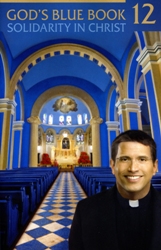

Blue Books 13, 12, 11, 10, 9, 8, 7,
6A, B, C, 3 –
$3.00 each plus postage


Blue Books 4 & 5 –$2.00 each plus postage


Blue Books 14 & 15 –$5.00 each plus postage
The more you use the Blue Books and
become one with Jesus – more
intimate with Jesus –
the more your lives are a blessing and
everything you do in life can help
to bring down great grace for the world
because of your being so
one with Jesus.
Guiding Light Homily Book Series
Fr. Joe’s Books
Cycle A –
Steadfast to the Son
Cycle B –
Focusing on the Word
Cycle C –
Feed My Soul
Cycle A –
Inspired to be Genuine4 for $20 plus postage of $5.95
These books can be given to:
1) All Priests
2) Good for Music Ministers
7) Good for Mom and Dads
3) Good for DRE's
4) Good for Deacons
5) Good for Principals of Schools
6) Good for Teachers
Given March 21, 2014
R. Pray for These Things
1) Pray for the Pope & hierarchy to help us start prayer chapters.
2) Pray for Dan, Sally Jo, Richard, Carol, Margaret, Sue,
Jack, Jean, Amanda, Matthew, Special intentions.
3) Pray for the priests, the Church and the world!
4) Pray for the spread of prayer chapters,
also for the spread of priests doing prayer chapters.
5) Pray for the spread of Blue Books.
6) People going to Florida and China.
7) Vocations to all 7 categories.
8) Pray for spread of Consecration and Rosary.
9) Pray for pope helping us.
10) Pray for Jeff - sales & health. Pray for Nick.
11) Blue Book 16 and cover and all involved.
For our Publisher and all involved
12) All intentions on my list, Jerry's list.
13) Priests getting Fr. Joe's book.
14) Pray for Fr. Joe's new book, cover & funds for printing & postage.
15) Donors and members and their families.
16) Healing of the Family tree.
17) Dan & Melanie, Catherine & mom, Gary, Mary Jo,
Jim & statues, Fr. Ken, Monsignor, Kerry, Tom & wife.
18) All who asked us to pray for them.
19) All we promised to pray for.
20) Rita, John, Doris, Sheila, Jerry, Regina, Sanja,
Betty, Sophie, Lisa, Eileen, Fr. Mike, Louie, Laverne,
2 Dons, Mary Ellen, Fr. Joe, all priests helping us,
Ed, Jimmy, Steve, a special couple, Rosie & all involved.
21) 2 babies and moms.
22) Funds and insurance.
23) Jerry's garage.
24) In thanksgiving for gifts, graces, & blessings received.
25) Spread the Blood of Jesus on all of us here.
26) Consecrate all hearts.
27) Cast the devil out of all of us here and all in Movement.
The Wedding Rosary
Crystal Image Rosary
$40 plus shipping
Original Image Rosary
8mm glass beads
in a matching gift box$40 plus shipping
Give the gift that counts.
Give to your priests Fr. Carter's Books plus postage.
Tell My People $5.00
Response to God's Love $8.00
Response in Christ $8.00
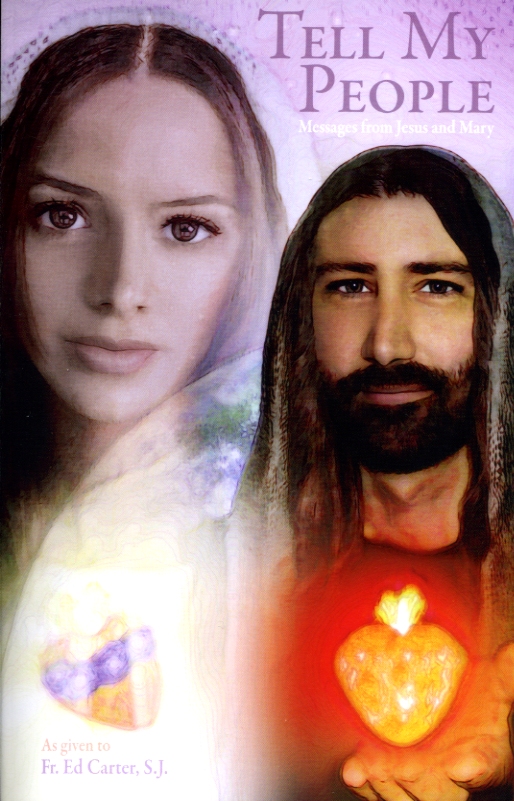
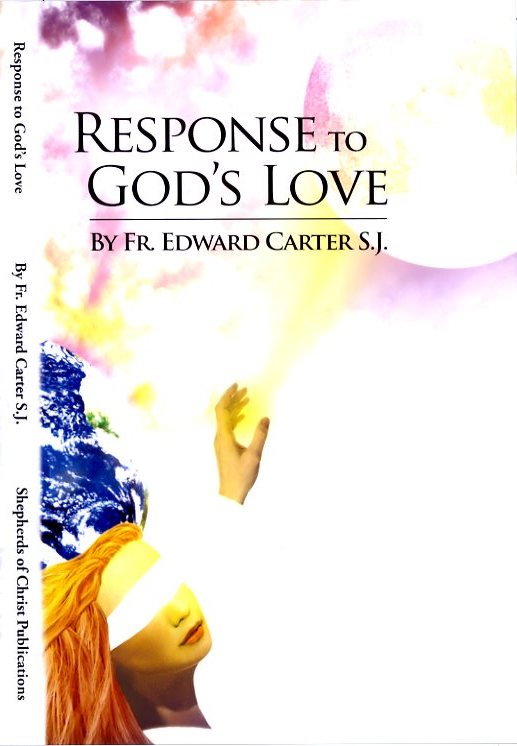
Old Mass Books with the Imprimatur
$2.00 plus postage
New Mass Book with Imprimatur
$8.00 plus postage
New Parents & Children's Book with the Imprimatur
$8.00 plus postage
Fr. Joe's Cycle A – Steadfast to the Sun – Starts in Advent
$5.00 plus postage
Give the gift that keeps on giving!
Give to your priest.
Fr. Carter's Priestly Newsletters Book II
$6.00 plus postage
Get a canvas print of Mary's image
with a sliver of glass and a little
bottle of Jesus and Mary water.
The glass will be fixed behind the
back of the picture.
$200.00 plus postage
Shepherds of Christ Ministries
P.O. Box 627 China, Indiana 47250
Telephone: (toll free) 1-888-211-3041 or (812) 273-8405
FAX: (812) 273-3182
Copyright © 2014 Shepherds of Christ.
Rights for non–commercial reproduction granted:
May be copied in its entirety, but neither re–typed nor edited.
Translations are welcome but they must be reviewed for moral and
theological accuracy by a source approved by Shepherds of Christ Ministries
before any distribution takes place. Please contact us for more information.